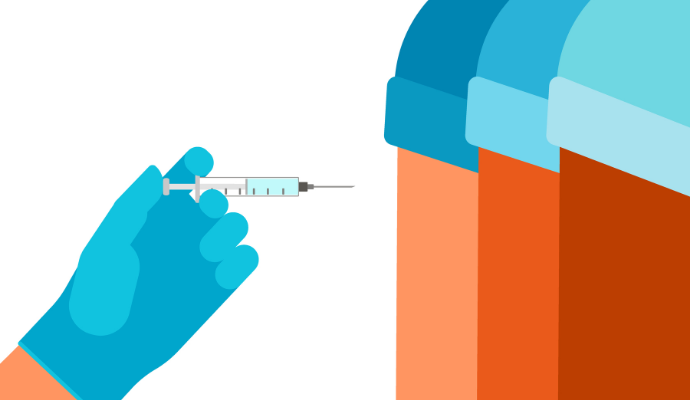6-in-1 Pediatric Vaccine from Merck, Sanofi Available Across US
The pediatric vaccine from Merck and Sanofi is the only hexavalent combination vaccine available in the US and is indicated for active immunization to help prevent six diseases.

Source: Getty Images
- Merck and Sanofi recently announced that their six-in-one combination pediatric vaccine is now available throughout the US.
Vaxelis is the first and only hexavalent combination vaccine available in the US and is indicated for the active immunization to help prevent diphtheria, tetanus, pertussis, poliomyelitis, hepatitis B, and invasive disease caused by Hemophilus influenzae type b.
The vaccine is currently FDA-approved for children six weeks through four years of age.
The approved dosage and administration for Vaxelis include a three-dose immunization series of a 0.5-milliliter intramuscular injection, administered at two, four, and six months of age. A three-dose series of the vaccine does not constitute a primary immunization series against pertussis.
“Given the potential to reduce the number of shots by as many as three in the first six months of life, as compared to pentavalent vaccines plus hepatitis B or Haemophiles influenzae type b vaccines, VAXELIS represents an important option for healthcare professionals and parents,” Joanne Monahan, senior vice president of US Vaccines at Merck, said in the announcement.
In February, the CDC and Prevention Advisory Committee included Vaxelis as a combination vaccine option in the CDC’s Recommended Child and Adolescent Immunization Schedule. The vaccine will be widely available in the US through both public and private channels.
Merck and Sanofi have been in contact with insurers and the pricing publications to notify them of the availability of Vaxelis.
Merck stated that the vaccine should not be given to anyone with a history of severe allergic reaction to a previous dose of the vaccine or any ingredients in the vaccine. Individuals also should not receive the vaccine if they have had a previous reaction to any other diphtheria toxoid, tetanus toxoid, or pertussis-containing vaccine, inactivated poliovirus vaccine, hepatitis B vaccine, or H. influenza type b vaccine.
Additionally, individuals with a history of encephalopathy within seven days of pertussis-containing vaccine or anyone with a history of neurological disorder should not take the vaccine until a treatment regimen is established and the condition is stabilized.
“As the first six-in-one vaccine in the [US], VAXELIS is now available to help protect infants and children against diseases caused by six infectious agents. We are proud to offer this vaccine to healthcare professionals and the patients they serve,” said Elaine O’Hara, head of Sanofi Pasteur Commercial Operations North America.
“Studies have shown that combination vaccines may help increase vaccination compliance and reduce disease burden by improving vaccine timeliness and coverage rates,” O’Hara continued.
The COVID-19 pandemic has greatly disrupted the administration of life-saving childhood vaccines. According to the World Health Organization (WHO), these disruptions threaten to undo the progress already made to reach more children and adolescents with a wider range of vaccines.
WHO noted preliminary data for the first four months of 2020 showed a substantial drop in the number of children completing three doses of the vaccine against diphtheria, tetanus, and pertussis (DTP3).
This is the first time in 28 years that there may be a reduction in DTP3 coverage, the organization said.
Therefore, in August, HHS issued a third amendment to the Declaration under the Public Readiness and Emergency Preparedness (PREP) Act to expand access to life saving childhood vaccines during the pandemic.
The increased access to vaccines decreases the risk of vaccine-preventable disease outbreaks as children in the US prepare to return to daycare and school.
The amendment authorizes state-licensed pharmacists or pharmacy interns under supervision to order and administer vaccines to individuals ages three to 18 years of age. Although pharmacists already play a vital role in annual influenza vaccinations, the amendment will give them a bigger part to play in a post-pandemic world.
